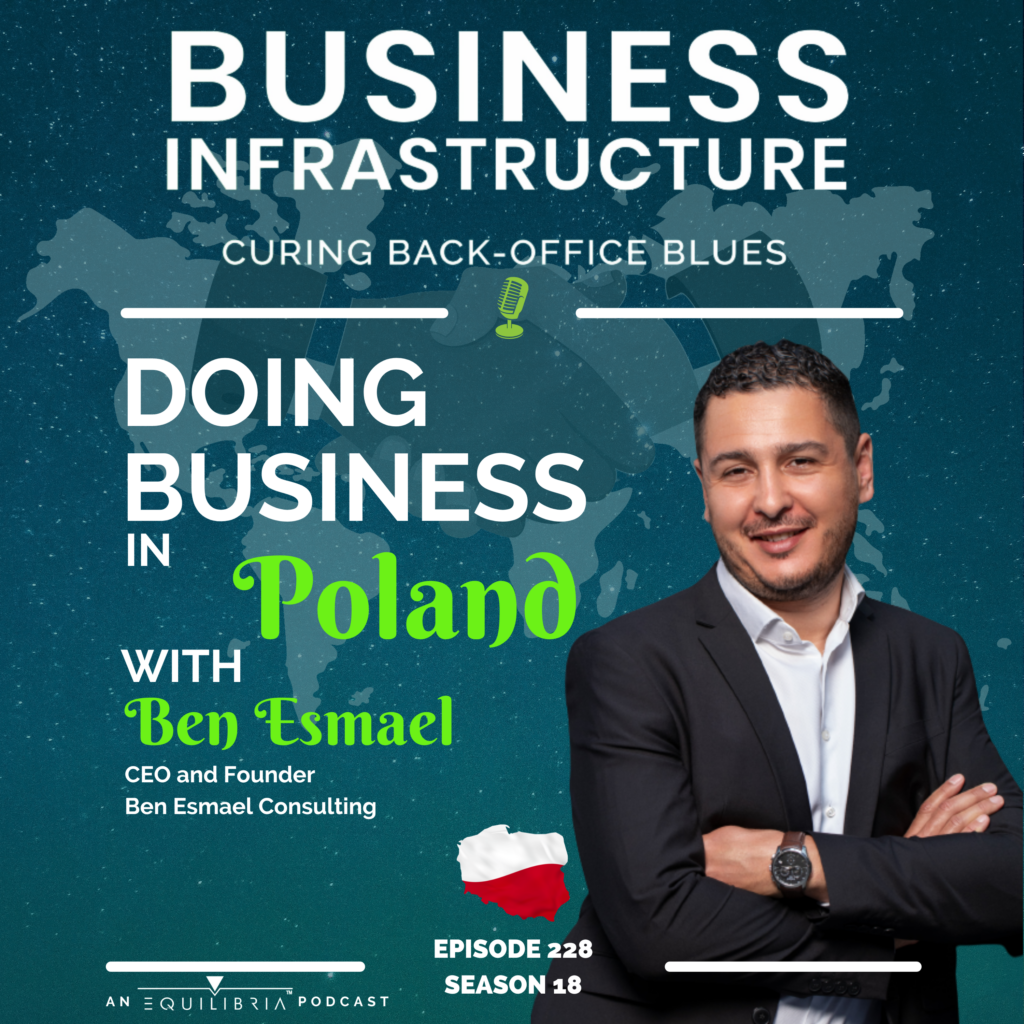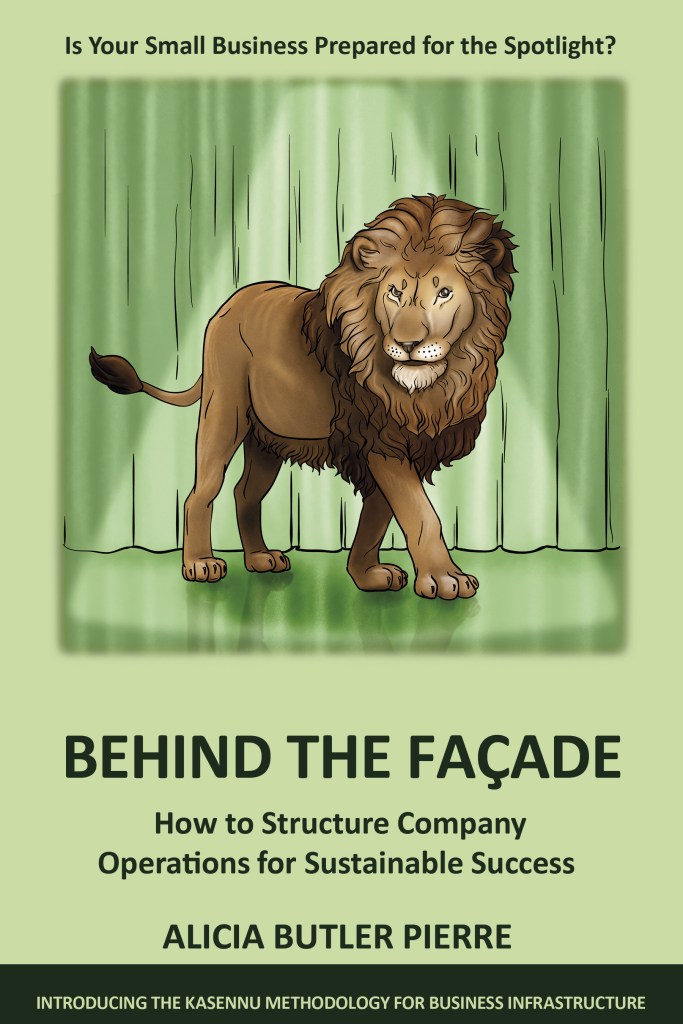Transcript
After basking in the tropical paradise of Bali, Indonesia we’re now aboard Equilibria Airlines headed on yet another long flight. This time we’re headed to Krakow, the second largest city in Poland which is situated in central eastern Europe. We’re looking forward to taking in the architecture, the food, and of course, how to do business there!
I’m Alicia Butler Pierre and this is Season 18 of the Business Infrastructure podcast – the show where we share operational tips, tactics, and tools for curing back-office blues. This particular trip to Poland is especially important to me because we’re meeting someone that I’ve come to call a trusted advisor and friend. He’s going to give us a no holds barred account of what it’s like to really do business in Poland and why the small business community is thriving there. I’m excited and I hope that you are too!

This episode is underwritten by Equilibria, Inc. the company behind this podcast where we design scale-ready business infrastructure for fast-growing small businesses.
We’ve landed at the John Paul II International Airport in Krakow. As we make our way through to the baggage claim area, we see a well-dressed man with a bright smile. It’s Ben Esmail and he’s here to pick us up and drive us to a shared services center where he has an office. As he drives us from the airport to our meeting location, we can’t help but notice the beautiful buildings and picturesque landscaping. But that’s not why we’re here. We’re here to talk business. And on that note…
This is Episode 228 – Doing Business in Poland with Ben Esmael
Ben, I’m so glad we’re finally able to catch up again! Of course, I know who you are but tell the folks who are listening right now who don’t know you.
Thank you, Alicia. It’s really, really exciting. I still remember our episode together, previously, so I’m really, really looking forward to this one with you and the show. So, my name is Ben Esmael and I am originally from Libya, but I’ve been calling Poland a home since 2015.
Now that’s a story I’m sure you’d like to know more about – how did Ben go from growing up in Libya to calling Poland, a country with a population 5 times larger, home?
Technically the story starts in 2009 when I finished my bachelor’s degree back home in Libya. And, I got the opportunity to work with, to tell the oil company and through that they created a program they call it 100 Talent. And that program basically goes through, a cycle of, tests and interviews, et cetera, to qualify for the final round of 100. And I remember that we were only three actually, that has a finance background or accountancy and the remaining 97, were engineers in different fields, you know, oil, energies, mechanics, electronics, and all of these things. The only three people finance made the cut through how that’s even possible because the exam that have created, it’s very complex for somebody who did a finance, it’s very easy for somebody did engineering because the mathematics was suitable for them, but for us it was really difficult.
But the story is that three of us actually done two years in engineering and then dropped off a change universities. So that’s the only way we made it through then two years and got into and into that program.
So, Ben is accepted into the 100 Talent program which lands him in France.
So, it’s a three-year scholarship, but you qualify for each year independently. Meaning if you don’t get the right level, French, to qualify for your master’s degree, you lose immediately your scholarship equally the first year in the master, if you don’t succeed in all of your classes and you’d be allowed to go to the second year according to the French education system, you basically disqualify. You don’t, continue.
So, then I learned French of course, and did a master’s degree in wealth management, but the minors, the finance and, banking and I stayed and lived in France for a while. I worked there as well in, in the finance sector. and then, moved to Austria.
While living in Austria, Ben worked for the multinational petroleum organization, OPEC. But unfortunately, his time there didn’t last long. Oil prices crashed and as a junior employee he soon lost his job.
This is how I landed in Poland. I just was looking for a job and, I was doing like 15 interviews a day. My wife used to laugh at me saying, “How many you have done today?” so yeah, I ended in Poland and since then called it a home.
And why Poland? I’m curious.
There’s not a specific reason why it was Poland. It was applying for everywhere. I just needed a job. I was living in Austria at that time. It was very expensive living in Vienna. I can’t live on for that long in my saving. So I’ve did many interviews in many countries, and the first offer came from IBM. And the second I remember, was HP, but both of them were in Poland. And this is how I made the decision to move in.
Interesting. Did the thought ever occur to you to go back home to Libya?
No. I’m kind of a runaway kid. I grew up in a very traditional family, and I remember my father say, “You get your freedom when you get to your diploma and wall.” That’s what he was telling me. It’s like, no freedom before you finish your school. So the moment I finish my school, I call it freedom.
And with his newfound freedom after finishing school, Ben actually did go back home to work in Libya. Tripoli to be exact. He worked as a management consultant for the Investment Complex for Building Materials, also known as INCOMA. He worked there for nearly five years before relocating to Austria.
The situation back, the country wasn’t really stable after the Civil War in 2011. So that started a layer of not having that desire to go back because the question was, “Oh, it could go back to do what?
Okay. So, let’s go back to you starting to work at IBM in Poland. What type of visa did you have to have? Did IBM help you secure a work visa?
Yeah, that’s correct. So, in Poland, as many other European countries now, the prices get more similar within the European Union, and I think even broadly and in other Western countries as well. So, when you get the job, technically they get you a type of sponsorship. So, they apply you on behalf for working visa. I didn’t need to do that because I have a permanent residency from France. So, for me, the process was much easier. I didn’t need, to start the work and then do only a work permit, as a foreigner. I didn’t need to go through the whole cycle above everyone else. So, the employer will apply on your behalf of a work visa and then once you get the work visa along with it, you get the work permit, and until then you can’t start the work, basically.
Ben worked as a Senior Reporting Accountant at IBM for about two years in Krakow, Poland. During that time, he worked on the entire cycle of mergers and acquisitions and soon yearned for new work challenges. This led him to leave IBM and accept a job at another global giant.
It wasn’t really a financial questions or promotions. It’s rather than I was looking for a new adventure, a new experience to learn and be of value. And this is where I moved to Heineken. It’s actually not far away from what they’ve done in IBM, but there’s just a bit an elevated level. So, I was leading, transformations within the back-office operation, all of the account payable, receivable reporting, recording and all of these things. So, my understanding of the core processes helps me lead and bring best practices to Heineken. So, they are connected, but it’s just a different layer of, you know, type of jobs and skills you would need for that as a project manager.
And as much as Ben enjoyed working at Heineken, he left there for the same reasons as leaving IBM – after learning and working on new types of projects, he felt a burning desire to expand his knowledge in other areas.
Poland’s very famous in shared service centers, so business process outsourcing, all of the back-office operations that being outsourced moved in either within the business or they’re just a third-party company to service them. I wanted to learn that piece of work, how to set up a shared service center, how to do migration projects, how you do process standardizations is taking a bit a more strategic and holistic type of role. And you know, how overseeing multiple projects or programs at the same time within a domain, of either finance or procurement or other type of businesses. And this is where Danish Crown came to the pictures, and got me interested, and it stayed with them almost two years and a half as well.
It was after this last stint with Danish Crown that Ben decided to start his own company, Ben Esmail Consulting, in 2019. What led him to leave behind a corporate career and pursue entrepreneurship instead?
It’s a long thought process. It has to do with my desire for having control of what I do when I do it, how I do it, when you work in corporate, world, there’s a ladder, there’s a chain of command and things has to, you know, to be agreed, signed off, aligned, whether that’s vertically, horizontally, and diagonally, whatever you call it. It’s like these things, it takes like 10 steps to do it. And then the second bit of it is that no matter how exciting the job is, you’ll be limited on opportunities that doors that will open for you. So being independent and doing, business consultancy, that’s key in a way that you will have that horizon of opportunities. You could do whatever you wanted if you got the right skill and you got the right network and, and you could learn so much more in a very short time. And of course, they are financially very, very rewarding. It’s way more optimal to be business owner than an employee.
By the time Ben started his consultancy, he was a permanent resident of Poland. I wanted to know if that’s a requirement to start a business in Poland.
Yes and no. So, there is many types of legal entity you can establish important one of them, which is not very common elsewhere in the western world, at least it’s called Sole Trader. It’s basically you and your company are one person, if that makes sense. It’s like you trade under your name and you can’t have any other names. You have to trade with your own name, full name, say Ben Esmael Consulting, and for this type of companies, you don’t have to have a permanent residency. Could be a temporary residency too, but you could be even a student residency cards, you could open this type of companies. It’s like a freelance type of business. It has its own perks and disadvantage. The perks are that it’s easy to set up requirements, very minimal, no accounting required.
You do your own accounting, you pay your own taxes, but you are in, your business has one liability, so you liable yourself. So, for example, if you want to say, go get some finances to buy equipment for your small business, that laptops or et cetera. It’s hard for you to get that if you haven’t got the cash in your bank account. So, your private bank account, and the company bank account are one. So, any liability from either part of activities, either as individuals or as business, they’re the same in the eyes of, the business ecosystem.
If you want to open a limited liability, that’s, not impossible, but it’s harder to do it if you’re not a permanent residence. But if you’re a permanent residence, you’ve got exactly the same right as citizens in term of establishing business and running a business in Poland.
Hearing more about the Sole Trader status is Poland begged the question, why does Ben sometimes show a different spelling of his last name. Sometimes it’s shown as “E-s-m-a-i-l and other times as E-s-m-a-e-l.” I’m sure there’s a reason for it and I wanted to know why.
So, the right way how it’s written of all my legal documents, “a-i-l,” right. And the reason why not I’m using my email, for example, is an “a- e-l” or even my LinkedIn, because there’s so many other people has exactly the same name, and I’d like to differentiate. So in a company wise, it’s been secured because that’s a legal resistor. And I can get that, I can get the a, i, no, I, I learned my lesson, so I’ve got two, I execute both names so no one can pick up even the other one version of it. So, but in the digital world where there’s the websites or there’s an email, link it in, I had to do this change.
Now that we’ve gotten that explanation out of the way, let’s get back to doing business in Poland. In my past conversations with Ben, he’s always mentioned Poland as being a pro-business friendly country. Why?
So, you and I had a chat I remember some time ago about the perceptions of what Poland is like for expats and foreigners. I’m talking here about foreigners from Europe, but also elsewhere, Africa or Asia or elsewhere to, I can tell you one thing is that it’s very, very good country to live in. And people are very open-minded. I’m not talking about only, big cities. I’ve been calling Poland since 2015 a home, and I can tell you that I have never seen an issue or problem, or they looked at you like who you are. People will even do efforts to understand you, help you out, guide you through. So it’s really a pleasant experience to be here.
In term of doing business and how easy it is, it isn’t because the process of establishing business and running a business is still complex and it has many reason to that. First of all, Poland, from that angle, still living its transformation to join in the less complex way of doing business. They still on that journey, but a lot had changed since they came in 2015. A lot of things got better, a lot of things now can be done online, doesn’t require you to go and premises physically. A lot of things available in English, both language, English and Polish. So that’s become easier. But my recommendation always for anyone wants start a business, you have to have the right team and advisor around you.
And that could be a legal office or a lawyer office or attorney that take you and support you in that journey because there’s so much nuances that you don’t want to miss because they may play in your disadvantages for taxation purposes, how you set up the company, the beneficiary, all of the legal details. And I think this is not only for Poland, to be fair, if I go to the U.S. I’m sure I would need somebody to help me out, even if everything is in English. So it’s not easy, but it’s not impossible. It’s very welcoming community. The key things in the consulting services, and you know it too, Alicia, we coming from the same world, is a network. So it doesn’t really matter how brilliant you are and doesn’t matter how much good portfolio you have done so far, it’s all about reputation and your name on the market, and if you get secured that day one, and then it’s an easier ride or easier ride if you wish.
Poland is going through a transformation. It’s legal system, it is business ecosystem going through a lot of changes. So either we have to do what we supposed to do, we have to do what we don’t supposed to do. So for, for the latter, you’ll find somebody, hire somebody to do it on your behalf, and there’s nothing better than two things important, a good accountant, then a good lawyer, and then you just have, of course you have to pay for that. But, I think’s well spent money.
Well, everything Ben’s said so far makes sense. You definitely have to network and as everyone so far on our 12-country tour this season has recommended, you must seek legal and accounting advice when conducting business in different countries. Coming up after the break, we’ll take a deeper dive into the types of businesses that tend to perform well in Poland and how you can get your business involved.
Do you need to grow your team but aren’t sure where to start let alone who to hire first? Do you have any of those back-office processes Ben Esmail mentioned documented?

If you own a fast-growing small business and want a company that can consistently operate without your daily presence, then the Smooth Operator course is for you. It’s an online introductory course on business infrastructure that can provide you with proven tools, tactics, and techniques to calm the chaos and restore order. Go to SmoothOperator.courses to learn more. That’s SmoothOperator.courses.
We’re back in Krakow, Poland with my friend, Ben Esmael. Before the break, we learned how Ben landed in Poland and ultimately started his own consulting firm. Now he’ll give us the scoop on the most popular type of business in Poland right now and specific resources you can leverage to expand your operations there. Here’s Ben.
So very, very big sector in Poland, in Krakow alone, which is the city I live in, it’s the second biggest in Poland. I think we have almost, three or 400,000 people working on those types of sectors. Entire Poland, by far is the biggest employer and there’s different models to that. It’s not only BPOs, but also shared service centers, so this the reasons why there’s a movement since Poland join in the European Union, which is make open to the urban market, there’s a massive amount of migrations processes, whereas businesses wanted to benefit from a labor arbitrage. So, it’s much cheaper basically to hire, in Poland than it’s hiring in home country. Say the U.K., Germany, France, it’s the same things that happen in the U.S. and Mexico.
A lot of the US companies open a shared service centers in Mexico or they did that with India. So, there’s big players in that domain, right? There is like GMPAC, Infosys, Accenture to certain extent, PWC, Deloitte, KPMGs, they’re all of them. They have a different model of offering services called bbl. But also, some businesses decided not to go for a third-party service provider. They created their own shared service center like Heineken. In the place where I work for example, it’s a shared service center. There’s a hub for their back-office processes and beyond anything that has to do with admin and business support. They created their own shared service centers. And this is what they call basically, in a business jargon captive model. They just move your processes from the home countries to a cheaper location, name new Poland, and then could be developed, become more complex, become a network of hubs like companies like ebb, for example, the Swiss business.
So it could be a network of more than one shared service, getting out a massive saving through a labor arbitrage. And number two, creating scalability so they can come up, standardize the process because it’s much easier to standardize the processes in the hub than at 10 different locations. And then of course when you do standardize your processes, you can bring technology, that solution that make it more efficient. And that’s because more easy to develop in one hub than again a dif 10 different markets.
What Ben just described has business infrastructure written all over it. Business infrastructure is a system for linking your people, processes, and tools and technologies to achieve scale that is sustainable, repeatable and profitable. He just shared how processes are scaled and streamlined through shared service centers, but what about the people element of business infrastructure? How can we as leaders and entrepreneurs leverage Poland to expand our remote teams? Are virtual assistants common in Poland?
Yeah, there is, of course, very good one is staffing services.
It’s like freelancers and some of them are digital nomads, like people are moving around Europe, they’re offering exactly the same type of services. There’s as well a very, very dynamic and growing communities of IT services like developers or tester or cybersecurity specialists who basically would do that job. Now, you might be interested to say, what’s the add value of choosing somebody in Poland over somebody in Philippines or in India? It depends on the business, right? So, if you are leading CRM, for example, if you would need somebody who speak multiple European language because your clients are based in Europe, you would need definitely somebody based in Europe who has the skill of these languages. Poland have one of the best language universities.
There’re so many people, they speak more than one language in addition to English and Polish language. This is one of the reasons actually shared service centers called PO and the hub because they’ve got access to these types of skills. So, there’s many, many services, do accounting services, for example, and I know another company friend of mine who has accounting services that service clients not only in Europe but also in North America, Canada, U.S., designers, you know, work page builders and all of these things. So, the same things we can get in India potentially cheaper, but if you are looking at somebody in a closer time zone, with certain type of skills saying speak in different language, European language because this is where your customers are then Poland could be a potentially one of the best, markets for you to choose talents from in Europe.
So, if you expand your business’ operations to include several countries throughout Europe, you should strongly consider taking advantage of the Polish labor market. Many of the entrepreneurs we’ve spoken to so far on our 12-country tour have mentioned the importance of working with clients outside of the country they’ve living and working in. I wondered if this was also the case in Poland – is it more advantageous to export goods and services rather than build a business serving Polish communities exclusively?
It depends on the strategy of the business you’re running. So it’s very beneficial if you are a business space in Poland and you focus on Poland. Again, it’s not small market. It’s one of the biggest actually in central eastern European countries region, one of the biggest buyers, a margin to the most dynamic economically. But if you are a business in Poland, it’ll make more sense to focus on exports, whether that’s goods and services than sell locally. And that’s, because of many factors. One is the currency difference, so it, Poland keeps on using your own local currency, so it’s very beneficial for you to get your invoices paid in euros or dollars.
It’s very advantageous when, from a tax perspective, if you’re doing exports, you potentially be a VAT net receiver because all of your exporting invoices or products will be without a VAT, all of your charges paid in the country with a VAT and then the third one is its way more efficient, and more competitive. If you go to the export, then you stay in the lock and market because the lock and market you play exactly with the same books as everyone else in the markets. It’s very, very transparent. But when you go outside, you’ve got that edge that your services will be all the time cheaper than other company, for example, based on Belgium servicing Belgium clients.
And what about Ben’s consultancy? Similar to us here at Equilibria, he wanted his consultancy to compete on bigger level by focusing on the large, corporate contracts. But that leaves smaller businesses in a conundrum. But he figured out a way to service them and still run a lucrative operation.
The small businesses that does not have the resources to hire the big four, but they’re in desperate needs to make that turnaround in their businesses and become more profitable or more leaner or more efficient or expand, whatever the reason is, and this is where I focus in, first of all, for me, there’s a diversity of the projects you could run where the second reason is that you’ll take the ownership of the entire things end to end, which is more interesting than doing only one piece of a bigger transformation portfolio. So, this is where I focus and what I do is a range of services that starts by defining target or operate model building a strategy for businesses, running projects, doing project management things as well as some staffing so I can get support the business with augmented resources to do specific project. And then basically they do a knowledge transfer and phase out once the project is being completed.
Ben’s built a business that enables him to provide services in high demand from the small business community. His business infrastructure includes a lean business model free of actual employees. Instead, he has a network of independent contractors he can tap into depending on the scope of a particular client’s project.
It’s because the market so volatile and you know it very well it’s a sometimes, hard decision. I rather not having somebody on in my books or than having somebody and then having to let go. I think that’s much easier. So, so, so I’ve got the flexibility to augment a number of resources available for any given projects.
And I’ve got the lean operation model, whereas if there’s nothing going on, I wouldn’t be impacted for a long period of time.
It has to get really, really bad for a very, very long time that I will suffer. That’s correct. And it’s amazing how many people have met in the last few months. It’s just, a momentum of refer me or refer you and like to give you hand and you give me hand. It’s just naturally set up that you don’t need to articulate or be more sophisticated in what you demand and what you’re looking for everyone is conscious and aware that it’s a win-win. So, once you get to that loop inside that community, that ecosystem, it’s a positive propel for anyone, not only me.
Yeah. And speaking of your lean operational model, I would imagine that a good bit of your back-office operations are digitized. Do you work with most of your clients remotely or are you going, you know, in person to work with your clients?
I think it’s like 90 remotely, 10% face to face. Just the whole shift in how we work and how we operate, how we run business post covid. It’s become permanent thing, it put emphasis on your skills and capacity to do as good job remotely as you were doing it face to face. I spend tremendous amount of time doing mistakes and learning from these mistakes. A lot but it’s an indication journey. This is the essence of consultancy.
For sure speaking of digitizing your operations, I know you are very plugged into the small business community. Speaking of actual resources, for those who are listening to this interview right now, Ben, what are some websites or the names of some organizations, incubator type programs for people who may be interested in starting a business in Poland or even finding out how to find people like you that they can potentially partner with on certain deals?
It’s a process, actually. There’re government places when you could log in and doing business import. But I think the best, if you can do that a very high level, like painting a big picture, Okay, this is how it looks like doing a business. And this includes listening to podcasts like you, Alicia’s doing with a lot of folks in Europe and how to do business in Europe, et cetera. And then move to the next step. Next step to me is to go to places like LinkedIn cause there’s the biggest profession network in the world then try to find professional on that domain that are you looking at, that’s a consultancy, that’s a shared service center as the BPOs, could be an investment funds, could be a banking sector.
There’s many, depends on your industry. You’re gonna look for people that have the knowledge to help you out. Once you identify these, you try just doing a simple reach out. Some of them would ignore the message, some of them you’ll be lucky enough. They’ll give you some time. And then the following one, if I’m not living in Poland as a person in another country, I will spend time a week or two coming down and join some entrepreneurial events.
And there’s so many of them in any cities, you can Google entrepreneurial events and you’ll find many on the internet. Most of them are for free. I used to do a lot of business breakfast. This is like phenomenon in Poland then continue to be a big thing where basically entrepreneurs just meet up between 6:00 AM in the morning and 8:00 AM before everyone starts their working day. You pay your symbolic fees for the breakfast, and you hang around, you meet people, and you have a conversation, exchanged contacts, and this is basically opened the door for you to go take it to the next level with whom you would be partnering with what type of business you’re looking at.
This is very similar to what Kathleen Beauvais and Peter Wright shared when we were in Canada. Attending networking events in person can be a game changer for your business. And, of course, making sure you talk to lawyers and accountants to help you figure out the right legal structure for operating a business in Poland as well as figuring out the taxation strategy. As we start to wrap up our conversation with Ben, I asked that he share more information about his podcast. It’s called The B and it’s a top 100 podcast in Central Eastern Europe.
I’m doing the podcast for two main reasons. Meet smart people. And those smart people usually are very, very busy.
So, I gained knowledge talking with you, Alicia, with other many peoples written a book, or they’re doing an entire business, but equally I get access to their network. So tomorrow, if a running project, I know what Alicia is doing, Alicia could be my partner in that business. And vice versa too, So, so this is why, and what’s, what’s the role of my podcast in my entire business I started that venture with a partner. But with time, it become evident that he doesn’t have time. I’m the only one is doing it. So, I, I basically took over the entire thing. I’m calling it the B, which is just Ben. We’ll keep it simple.
Keep it simple, indeed. But don’t be fooled, when things appear to be simple, you can rest assured there’s a series of complex decisions made behind the scenes to achieve that simplicity. Ben, thank you so much my friend for taking time to share your knowledge about doing business in Poland with us. I really appreciate it!
Thank you. Thanks Alicia, for having me. Pleasure.
Ben is such a breath of fresh air and I hope you found this conversation to be both informative and enlightening. Be sure to check out Ben’s website, connect with him on LinkedIn, and access the resources he shared during this interview. You can do all of that by visiting BusinessInfrastructure.TV.
As Ben drives us back to the airport, we excitedly tell him about the next country we’re visiting. He’s intrigued and asks that we keep him posted. So…where exactly are we headed next? Well, you’ll just have to come back for the next episode to find out!

Thank you for tuning in! If you enjoyed this episode, then please subscribe and leave a five-star rating and review.
Expanding your business’ operations isn’t impossible, but it also isn’t easy as Ben shared. But keep in mind, we’re all here for you so stay focused and be encouraged. This entrepreneurial journey is a marathon and not a sprint.
This podcast was written, produced, and narrated by me, Alicia Butler Pierre. Audio editing by Olanrewaju Adeyemo. Original score and sound design by Sabor! Music Enterprises.
This is the Business Infrastructure – Curing Back-Office Blues podcast.












